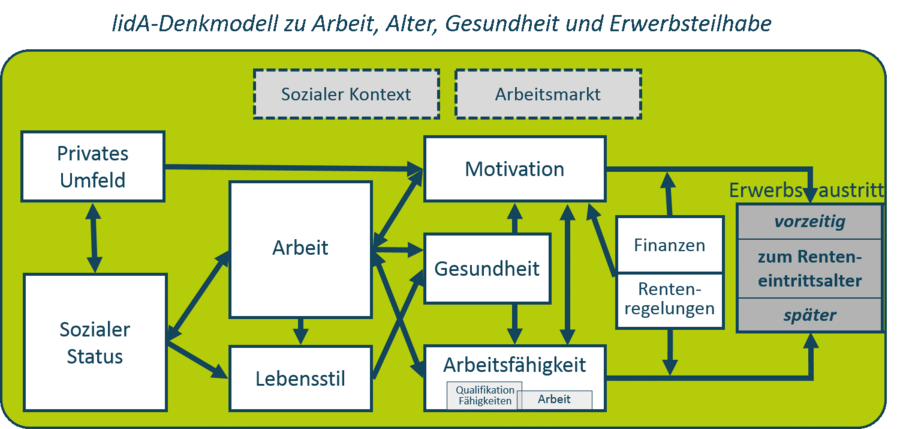The overarching research aim of the Department of Occupational Health Science is to contribute to a differentiated understanding of the interrelationship of work, on the one hand and work ability, employability and work participation, on the other. The results will be of relevance for politics, economy, research and not least for the employees themselves.
- Work-related determinants of work participation
- Role of health in work participation
- Motivation to participate
The core task of the research work is to specifically investigate the role of work (e.g. work factors) for employment participation in the context of further domains. The theoretical construct “motivation to continue working” will be explored and operationalised in the next few years. This will close an important gap in retirement research. The department is involved in promoting an international cross-research community exchange to further develop differentiated understandings of retirement research.
- Work Ability
- Work design to ensure participation
Demographic change will lead to a further shortage of labour in Germany in the coming years. This is a constantly increasing challenge for the economy and enterprises. Changed retirement policies will reduce early exit options and increase effective retirement age. This will contribute to an increase in the proportion of older workers with reduced functional abilities. Companies will have to offer working conditions which provide the highest levels of occupational safety and assure humane working conditions. Our department conducts research on the basic "concept of the ability to work". Among other things, it is about better understanding whether and under what circumstances working with poor health or functional limitations is possible at all and which measures in the workplace facilitate or enable this.
The "lidA- leben in der Arbeit" study is a cohort study in Germany which has been researching "work, age, health und work particapation" since 2009. Older employees born in 1959 and 1965 are interviewed at home every three to four years. The sample is representative of the labour force subject to social security contributions of the same age groups in Germany. Survey wave 1 (2011) included 6,585 participants, survey wave 2 (2014) 4,244 participants and survey wave 3 (2018) 3,586. The fourth wave of the survey is now taking place in 2022. The conceptual background is the "lidA conceptual framework on work, age, health and work participation".
The Department of Occupational Health Science, University of Wuppertal leads the lidA study. The third wave of studies was significantly financed by science and research from the state of NRW until the end of 2019 and is currently still funded by social security institutions. Contractual cooperation partners are the University Hospital Düsseldorf (Institute of Medical Sociology) and the University of Duisburg-Essen (Institute for Social Work and Social Policy).
More information can be found here Ebener, Hasselhorn, 2015 , www.arbeit.uni-wuppertal.de oder www.lida-studie.de.
The scientific work on the topic of "Work, Age, Health and Work Participation", Department of Occupational Health Science, University of Wuppertal is accompanied by a scientific advisory board (AAGE Advisory Board).
Members of the AAGE Advisory Board are:
• Prof. Dr. Martina Brandt, Institute of Sociology, Technical University of Dortmund
• Prof. Dr. Dirk Hofäcker, Institute of Social Work and Social Policy, University of Duisburg-Essen
• Dr. Andreas Mergenthaler, Federal Institute for Population Research, Wiesbaden
• Prof. Dr. Andreas Müller, Work and Organisational Psychology, University of Duisburg-Essen
• PD Dr. Morten Wahrendorf, Institute of Medical Sociology, University Hospital Düsseldorf
• Prof. Dr. Susanne Wurm, Institute of Psychogerontology, Friedrich-Alexander-University, Erlangen-Nürnberg
The basis and framework of the scientific work of the department is the "lidA Conceptual Framework on Work, Age and Work Participation". Making it possible to understand the participation of older employees in the labour market more precisely and to encourage interdisciplinary consideration and processing of the topic.
The study compiles determinants of employment participation among older employees in eleven domains (e.g. work) and highlights important interdependencies among them.
The conceptual framework illustrates four central characteristics of work participation among older workers: complexity, processuality, individuality and structure dependence.
- Complexity,
- Processuality,
- Individuality and
- Structure Dependence
The framework serves as the basis of the lidA-Study and is now the conceptual basis of an international scientific debate on the topic (see Hasselhorn/Apt 2015).


